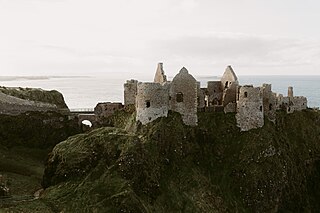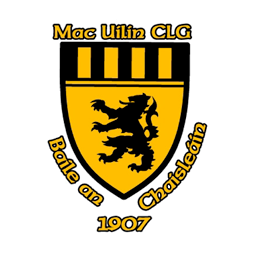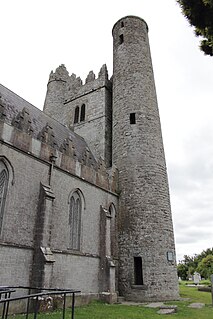
County Antrim is one of six counties that form Northern Ireland. Adjoined to the north-east shore of Lough Neagh, the county covers an area of 3,046 square kilometres (1,176 sq mi) and has a population of about 618,000. County Antrim has a population density of 203 people per square kilometre or 526 people per square mile. It is also one of the thirty-two traditional counties of Ireland, as well as part of the historic province of Ulster.
Sorley Boy MacDonnell, also spelt as MacDonald, Scoto-Irish chief, was the son of Alexander MacDonnell, lord of Islay and Kintyre (Cantire), and Catherine, daughter of the Lord of Ardnamurchan, both in Scotland. MacDonnell is best known for establishing the MacDonnell clan in Antrim, Ireland, and resisting the campaign of Shane O'Neill and the English crown to expel the clan from Ireland. Sorley Boy's connection to other Irish Catholic lords was complicated, but also culturally and familiarly strong: for example, he married Mary O'Neill the daughter of Conn O'Neill. He is also known in English as Somerled and Somerled of the yellow hair.
Breage or Breaca is a saint venerated in Cornwall and southwestern Britain. According to her late hagiography, she was an Irish nun of the 5th or 6th century who founded a church in Cornwall. The village and civil parish of Breage in Cornwall are named after her, and the local Breage Parish Church is dedicated to her. She is a saint in the Orthodox Church and Roman Catholic Church.

The Ó h-Anluain family was an agnatic extended family comprising one of a string of dynasts along the Ulster-Leinster border. Depending on the advantage to the sept, the named leader—The O'Hanlon—supported either the Earl of Tyrone or authorities within the English Pale. During the 15th century, ties were close with the famed Earls of Kildare. Frequently, members of the sept would be on either side of a rebellion. Some would be outlawed; others pardoned; some ending up on the winning side.

Vincent Madelgarius, aka Maelceadar, Benedictine monk, died 677. His feast day is September 20.
Eithne and her sister Sodelb are two relatively obscure Irish saints from Leinster who are supposed to have flourished in the 5th century. They are commemorated together in the Irish martyrologies on 29 March, though 2 and 15 January were also marked out as feast-days. The 17th-century scholar John Colgan believed that a Life written for them had been witnessed in c. 1490 by Cathal Óg Mac Maghnusa, whom he regarded as the author of additions to the Félire Óengusso. Although nothing of the kind has come to light, they do make cameo appearances in the Lives of two better known 6/7th-century saints, Áedan and Moling, both bishops of Ferns.
The Three Collas were, according to medieval Irish legend and historical tradition, the fourth-century sons of Eochaid Doimlén, son of Cairbre Lifechair. Their names were: Cairell Colla Uais; Muiredach Colla Fo Chrí ; and Áed Colla Menn. Colla Uais ruled as High King of Ireland for four years. Recent DNA analysis confirms the history of the Three Collas in fourth-century Ireland, but questions their descent from Eochaid Doimlén and Cairbre Lifechair.
The Battle of Aura, was fought in the middle of the sixteenth century between the MacDonnells, led by Sorley Boy MacDonnell, against the McQuillans and O'Neills, in which the MacQuillans and O'Neills were defeated. Translated, Slieve-an-Aura means Hill of Battle – the modern spelling is Slieveanorra.
Fintan is an Irish given name. In Irish mythology, Fintan mac Bóchra is said to be the sole survivor of the Great Flood on the island of Ireland, subsequently becoming a personification of old age and knowledge. As a shapeshifter, he appears to be identical to the Salmon of Wisdom and the name may thus have deeper roots in Celtic mythology. The mythical figure is probably the source for the use of the name in medieval and modern times.

The Route was a medieval territory in Gaelic Ireland, being located on the north-east coast of Ulster. The territory stretched along parts of the coastline of what is now County Londonderry and County Antrim, stretching between Coleraine and Port Brittas (Ballycastle), being bounded on the south by the Clogh River. Originally part of Twescard, a county of the Earldom of Ulster, it was later ruled by the MacQuillans and then the MacDonnells.
The Múscraighe were an important Érainn people of Munster, descending from Cairpre Músc, son of Conaire Cóem, a High King of Ireland. Closely related were the Corcu Duibne, Corcu Baiscind, both of Munster, and also the Dál Riata of Ulster and Scotland, all being referred to as the Síl Conairi in Irish and Scottish legends. A more distant ancestor was the legendary monarch Conaire Mór, son of Eterscél, son of Íar, son of Dedu mac Sin.
Mainchín mac Colláin was an Irish saint in Corran who is supposed to have flourished in the late 5th or 6th century.
Clan McQuillan is an Irish clan that descends from the north coast of County Antrim, Ireland. Still a popular name throughout County Antrim, the McQuillans are known mostly for their association with Dunluce Caste and for their battles with the Scottish McDonnell clan.

Poyntzpass is a small village on the border between southern County Armagh and County Down in Northern Ireland. It is situated in the civil parish of Ballymore and the historic barony of Orior Lower within the Armagh City and District Council area. It had a population of 552 people in the 2011 Census. It was a part of the South Armagh constituency and is now part of the Newry and Armagh constituency, and was one of the places in South Armagh where the Ulster Covenant could be signed.
The 2011 All-Ireland Football Final was the 124th event of its kind. It was the culmination of Gaelic football's premier competition, the All-Ireland Senior Football Championship, and was played between Kerry and Dublin on 18 September 2011 at Croke Park, Dublin.

McQuillan GAC Ballycastle is a Gaelic Athletic Association club located in the town of Ballycastle in County Antrim, Northern Ireland. The club is affiliated with the Antrim county board. The club participates in both hurling and Gaelic football but is known primarily for its hurling successes. They play their home matches at Páirc MacUílín which has also hosted the Antrim Senior Hurlers in recent years due to the ongoing redevelopment of Casement Park. The Club is sponsored by Parker Transport a local business in the town.
The Cenél nEógain or Kinel-Owen are a branch of the Northern Uí Néill, who claim descent from Eógan mac Néill, son of Niall of the Nine Hostages. Originally their power-base was in Inishowen, with their capital at Ailech, in modern-day County Donegal in what is now the west of Ulster. Under pressure from the Cenél Conaill, they gradually spread their influence eastwards into modern counties Tyrone and Londonderry, pushing aside the Cruithin east of the River Bann, and encroaching on the Airgiallan tribes west of Lough Neagh. By the 11th century their power-base had moved from Ailech to Tullyhogue outside Cookstown, County Tyrone. By the 12th century the Cenél Conaill conquered Inishowen; however, it mattered little to the Cenél nEóghain as they had established a powerful over-kingdom in the east that had become known as Tír Eoghain, or the "Land of Owen", preserved in the modern-day name of County Tyrone.

The 2017 All-Ireland Senior Football Championship Final, the 130th event of its kind and the culmination of the 2017 All-Ireland Senior Football Championship, was played at Croke Park in Dublin on 17 September 2017.

Finan Cam, Abbot of Kinnity was an early Irish saint associated with County Kerry, Ireland, who lived in the 6th century AD, and possibly the 7th century. To distinguish him from other saints of the same name the appellation of Cam or "crooked" has been given to him, either because he was stooped or because he had a squint. His feast day is 7 April.

Saint Macculind was an early Irish saint who was abbot or bishop of Lusk.








